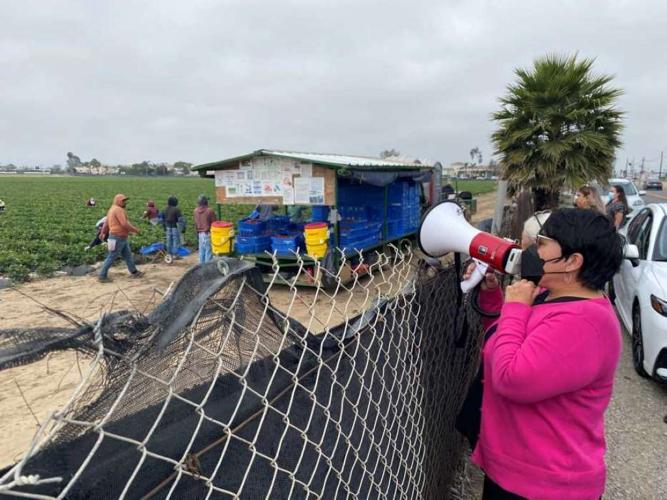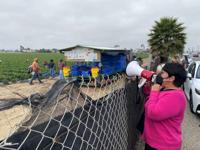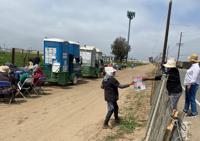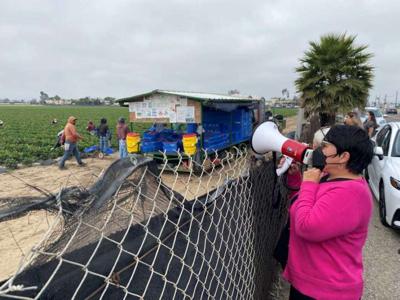PICTURED: California Labor Commissioner Lilia García-Brower speaks to farmworkers. Photo by Paola Laverde, DIR Communications
by Alex Wilson
California Labor Commissioner Lilia García-Brower wanted to make her message to Oxnard farmworkers about labor laws loud and clear.
That’s why she brought a specially designed box truck covered in brightly lit displays with a powerful sound system to a three-day caravan that stopped by local farms May 25-27.
Information was announced in Spanish and other languages spoken by Indigenous farmworkers, Mixteco, Purépecha and Zapotec.

The specialized vehicle used to deliver messages about labor rights. Photo by Paola Laverde, DIR Communications
García-Brower also handed workers flyers about laws involving wage theft, sick leave, COVID precautions and preventing heat illness.
“A law cannot be exercised if you don’t know it. So we have to reach people to ensure that they understand their rights and that they trust us,” she said. “There are so many workers. We have to amplify this message.”
The caravan started off with a news conference at downtown Oxnard’s Plaza Park where representatives from several farmworker advocacy groups spoke about hardships faced by farmworkers, including Mixteco Indígena Community Organization Project, also known as MICOP, and a charity devoted to helping women farmworkers, Líderes Campesinas.
Cal/OSHA Bilingual Community Engagement Liaison Lourdes Cruz said one of the most important messages was about laws to prevent heat illness that require employers provide water, shade, breaks and emergency plans. Cruz said the consequences of failing to follow those laws can be dire.
“What happens is that they get ill, they get sick, and unfortunately, sometimes if people are not accustomed to working in the heat, they can even die. So it’s really important for them to be able to take their break,” she said.
Cruz said Cal/OSHA wants to hear from workers regardless of immigration status. Confidential complaints can be made by calling 833-579-0927, she said.
Cruz said it’s the second year in a row that organizers launched the caravan in Oxnard, and they had a great response the first time around. “It was fantastic. Our community organizations were very pleased that we were out there informing farmworkers about their rights. So it’s something that we do want to continue.”

Farmworker accepting information on labor rights. Photo by Paola Laverde, DIR Communications
García-Brower said one of the hurdles her office must overcome is mistrust among immigrants who are fearful of government.
“We know that as government we have a bittersweet relationship with the poorest workers. And it is not enough to pass laws and expect people are going to exercise them, because they don’t,” the labor commissioner explained. “So this is part of my initiative to heal that broken trust. We have to get out to where the community is, and communicate, to also make sure employers understand what their obligations are.”
While her agency uses a variety of media strategies to reach workers, including print and broadcasting advertisements as well as social media, those methods don’t always reach the people they’re targeting, García-Brower said.
“When I go out in the community, so many workers don’t understand their rights, and so many workers don’t believe that there’s something that they can do. So we knew we needed to do something else,” she said. “So this caravan was a strategy to amplify this message and have a presence in the community with trusted messengers.”







